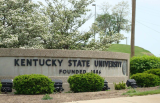'Blurred Lines,' Robin Thicke's controversial number one single, is making headlines for all the wrong reasons.
After the University of Edinburg condemned the song, The University of Leeds' Student Union has also banned it for allegedly encouraging rape culture. The Union has decided not to play the chart-topping hit single in its buildings and at any of its three nightclubs or two bars as the lyrics and steamy music video 'undermines and degrades women.'
"The reaction has been mainly positive. A few students are asking why if we have banned this song, we aren't banning everything, but we've chosen this one as an example, because it's so popular," Alice Smart, an officer at Leeds' student union said.
An excerpt of the lyrics:
'I hate these blurred lines, I know you want it,' 'must wanna get nasty' and 'I'll give you something big enough to tear your ass in two.'
Robin Thicke defends Blurred Lines' lyrics and video:
In a GQ magazine interview, the singer dismissed the allegations as 'ridiculous' and said that he has 'always respected women.' Thicke said that he basically 'wanted to make it funny.' He also stated that the song is 'actually a feminist movement.'
Besides its cheesy lyrics promoting consensual sexual activity, several feminist critics have also slammed the pop hit for being 'irresponsible' in its music video as it shows naked women alongside fully-clothed men, which Thick describes as art.
"That's what great art does. It's supposed to stir conversation, it's supposed to make us talk about what's important and what the relationship between men and women is, but if you listen to the lyrics it says 'That man is not your maker.' It's actually a feminist movement in itself," Thicke said.
According to digitalspy, the track which features T.I. and Pharrell Williams has topped chartbusters all around the world and is currently the best-selling single of 2013 in the U.K.
'Blurred Lines' lyrics are what real rapists say?
The Sociological Images blog claimed that Robin Thicke's lyrics are similar to the lines used by genuine rapists on their victims. The sociology blog compared the lyrics to the images from Project Unbreakable - an online photo essay exhibit that features survivors holding signs noting what their rapists said to them before, during, or after their assault. They found that the song's sentences matched with the instances of non-consensual sexual activity.
© 2025 University Herald, All rights reserved. Do not reproduce without permission.








